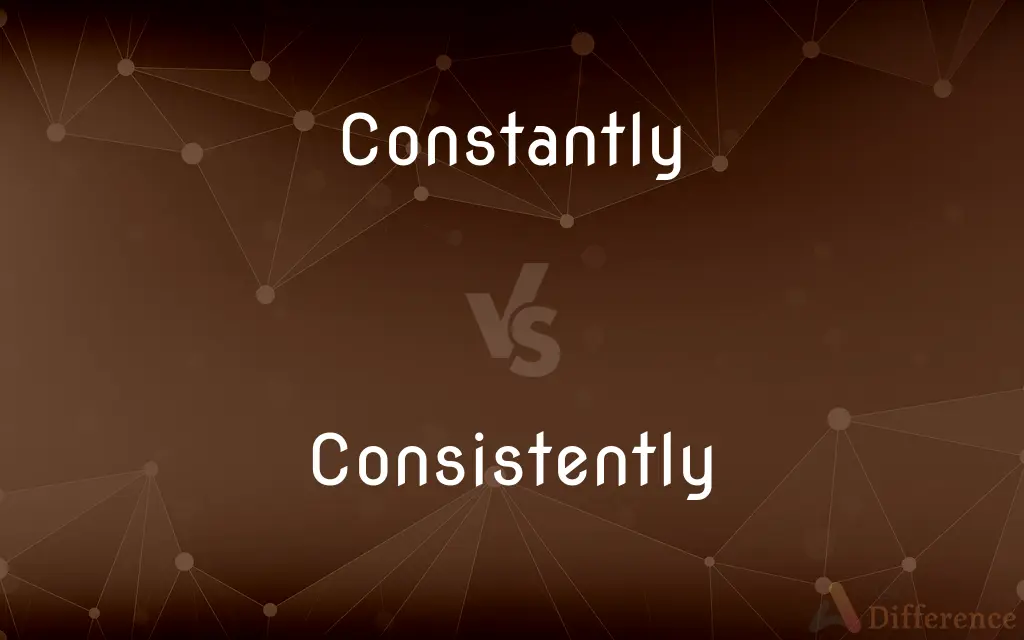Constantly vs. Consistently — What's the Difference?
Edited by Tayyaba Rehman — By Fiza Rafique — Updated on October 12, 2023
Constantly implies ongoing without interruption, while Consistently means regularity in actions or principles over time.

Difference Between Constantly and Consistently
Table of Contents
ADVERTISEMENT
Key Differences
Constantly often describes an action or state that is continual, without breaks or interruptions. This word focuses on the persistence of an occurrence. In contrast, Consistently emphasizes reliability and the repetition of similar actions or states across different instances or over time.
When one speaks of a machine working Constantly, it implies the machine is running all the time without halting. However, if the machine operates Consistently, it means the machine produces reliable results every time it is used, not necessarily that it's always running.
In the realm of behavior, someone who talks Constantly might be seen as incessant or even annoying, as their talking appears non-stop. On the other hand, someone who behaves Consistently exhibits a pattern in their actions, indicating predictability, whether it's good or bad behavior.
In personal habits, a person might drink water Constantly throughout the day, suggesting they rarely go a moment without sipping. Yet, if they exercise Consistently, it signifies they follow a regular routine, like working out every Monday, Wednesday, and Friday.
From a quality perspective, a light that shines Constantly remains lit at all times. A product that performs Consistently delivers the same quality of output or service each time it's used, ensuring reliability and predictability.
ADVERTISEMENT
Comparison Chart
Definition
Ongoing without interruption.
Regularity in actions or principles over time.
Focus
Persistence.
Reliability.
Behavior Context
Non-stop action.
Predictable pattern.
Routine Context
Doing something all the time.
Following a regular routine.
Quality Context
Uninterrupted state or action.
Same quality of output or behavior each time.
Compare with Definitions
Constantly
At every opportunity or moment.
The toddler constantly asks questions about everything.
Consistently
In a systematic and reliable manner.
She consistently delivers her projects on time.
Constantly
All the time without interruption.
She constantly checks her phone for messages.
Consistently
In a way that does not contain contradictions.
The theory is consistently supported by the evidence.
Constantly
Unceasingly; always active.
The clock's ticking constantly kept me awake.
Consistently
In all cases or instances.
The employee consistently meets the company's standards.
Constantly
Not changing or varying; continuous
A constant gentle rain.
Drove at a constant speed.
Consistently
Regularly over a period.
The team has been consistently winning for the past few seasons.
Constantly
Happening regularly or repeatedly; continual
The constant barking of the dog next door.
Constant interruptions.
Consistently
Without deviation; steadily.
He consistently chooses the same menu item at the restaurant.
Constantly
Unchanging in nature, value, or extent; invariable
A constant wind speed.
Consistently
In agreement; compatible
The testimony was consistent with the known facts.
Constantly
Steadfast in purpose, loyalty, or affection; faithful
A constant friend.
Consistently
Being in agreement with itself; coherent and uniform
A consistent pattern of behavior.
Constantly
Something that is unchanging or invariable.
Consistently
Reliable; steady
Demonstrated a consistent ability to impress the critics.
Constantly
A quantity assumed to have a fixed value in a specified mathematical context.
Consistently
(Mathematics) Having at least one common solution, as of two or more equations or inequalities.
Constantly
An experimental or theoretical condition, factor, or quantity that does not vary or that is regarded as invariant in specified circumstances.
Consistently
Holding true as a group; not contradictory
A consistent set of statements.
Constantly
(archaic) With steadfastness; with resolve; in loyalty, faithfully.
Consistently
(manner) In a consistent manner.
Constantly
In a constant manner; occurring continuously; persistently.
Consistently
(frequency) constantly; always.
Constantly
(frequency) Recurring regularly.
I find that I am constantly reminding you to feed your pets.
Consistently
In a consistent manner.
Constantly
In an unchangeable or invariable manner; in every case.
Consistently
In a systematic or consistent manner;
They systematically excluded women
Constantly
With constancy; steadily; continually; perseveringly; without cessation; uniformly.
But she constantly affirmed that it was even so.
Constantly
Seemingly uninterrupted;
Constantly bullied by his big brother
Was perpetually answering the doorbell
Constantly
Without variation or change;
Constantly kind and gracious
Constantly
Without interruption;
The world is constantly changing
Constantly
Persistently over a period.
He constantly reminds us of the meeting's importance.
Constantly
In a consistent, unvarying manner.
The temperature remained constantly cool in the basement.
Common Curiosities
If someone performs Consistently, does it mean they never change?
Not necessarily. It means they exhibit a regular pattern, but the action itself might vary.
Can Constantly be used to describe feelings?
Yes, e.g., "She constantly feels anxious."
Does Constantly mean something is always happening?
Yes, "constantly" suggests an ongoing action without interruption.
Can Constantly refer to frequency?
Yes, it can imply something happens frequently and without pause.
What does "consistently good" mean?
It means the quality is reliably good every time.
Can Constantly indicate annoyance?
In some contexts, yes. E.g., "He constantly interrupts," suggests it's bothersome.
What does "consistently applied" mean?
It means a method or rule is applied in the same manner every time.
Does Consistently imply reliability?
Yes, "consistently" denotes regularity and reliability over time.
Can a machine run Consistently but not Constantly?
Yes, it can operate reliably when used but not run all the time.
What does "constantly changing" mean?
It means undergoing change all the time without pause.
Are the adverbs Constantly and Consistently interchangeable?
While they might overlap in some contexts, they have distinct nuances; "constantly" emphasizes persistence, while "consistently" emphasizes reliability.
Is there ever overlap in the use of Constantly and Consistently?
Yes, in some contexts they might be used interchangeably, though nuances differ.
Does "consistently improving" mean there's steady progress?
Yes, it indicates regular and reliable advancements.
Can you use Consistently to describe patterns?
Yes, "consistently" denotes a predictable pattern or regularity.
If a noise happens Constantly, does it ever stop?
No, it suggests the noise is ongoing without interruption.
Share Your Discovery

Previous Comparison
Mucopurulent vs. Purulent
Next Comparison
Colpate vs. ColporateAuthor Spotlight
Written by
Fiza RafiqueFiza Rafique is a skilled content writer at AskDifference.com, where she meticulously refines and enhances written pieces. Drawing from her vast editorial expertise, Fiza ensures clarity, accuracy, and precision in every article. Passionate about language, she continually seeks to elevate the quality of content for readers worldwide.
Edited by
Tayyaba RehmanTayyaba Rehman is a distinguished writer, currently serving as a primary contributor to askdifference.com. As a researcher in semantics and etymology, Tayyaba's passion for the complexity of languages and their distinctions has found a perfect home on the platform. Tayyaba delves into the intricacies of language, distinguishing between commonly confused words and phrases, thereby providing clarity for readers worldwide.














































